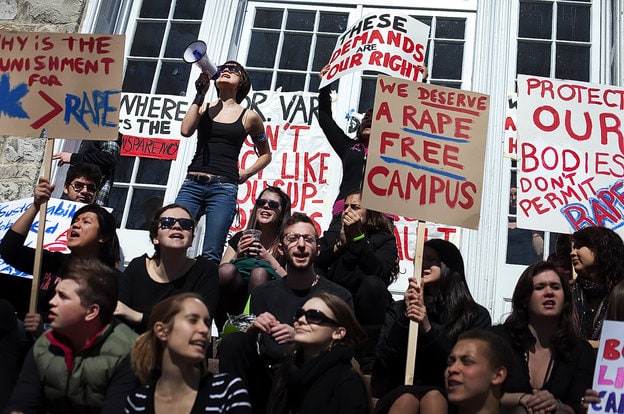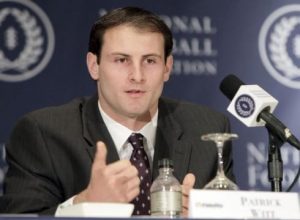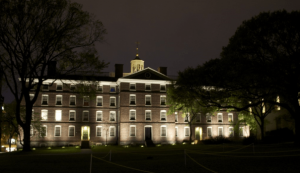
How Accusers Play the Drinking Game at Washington and Lee
As you’ll see from the this list of stories, the male students who have the resources to challenge the illegal bullying of their constitutional rights do so by filing a due process lawsuit, like the one facing Washington and Lee. The facts, by this point, are depressingly familiar.
Two students had a sexual encounter after attending a party, during which both consumed alcohol. The next morning, the accused student drove the accuser back to her dorm. The next day, the accuser told a friend that she had a good time the previous evening, and made no mention of any assault; and the accuser hooked up with the accused student a month later. Many months later, and after working over the summer at a women’s clinic, the accuser indicated that she’d had an “evolution” in how she felt about the incident, which she now concluded was a sexual assault.
Part of this evolution was seeing the name of the accused student—who she had also discovered now had a girlfriend—on the acceptance list for a college program in Nepal.
Originally posted January 26, 2015. Read more about the Washington and Lee case here.
Railroading at Vassar

Peter Yu and a fellow member of the crew team attended a party, had quite a bit to drink, and then returned to his room to have sexual relations. Yu’s roommate interrupted them, the accuser said she didn’t want to go any further, and she left—following this up with several Facebook messages, over many weeks, in which she expressed regret for how the evening had wound up. Then, on the last day allowed under Vassar procedures, Walker (whose father is a Vassar professor) filed a sexual assault complaint at the school; the timing precluded Yu’s filing a counter-claim…
Perhaps the most problematic aspect of the Yu case was the sense that the accuser—whose father, after all, is a Vassar professor—gamed the system. Her waiting until the very last moment to file charges robbed Yu of a chance to file counter-charges—that is, to claim that since both parties were drunk, the accuser was as guilty of sexual assault as was he. And her pushing the case to the IVP ensured that she would be judged solely by colleagues of her father, rather than by a mixture of students and faculty members.
Originally posted April 5, 2015. Read the entire story here.
After an Alleged Rape at Columbia, “I Love You Paul. Where Are You?”

Alleged victim Emma Sulkowicz continued to have chatty and playful Facebook exchanges with alleged rapist Paul Nungesser for weeks after she says he brutally violated her and choked her within an inch of her life. After the alleged rape On Oct. 3, Sulkowicz’s birthday, Nungesser sent her an effusive greeting; she responded the next morning with, “I love you Paul. Where are you?!?!?!?!”
Originally posted February 10, 2015. Read about Columbia’s “mattress girl” here.
How Drunk Can You Get at Cornell?
Two students had intimate relations after a night of drinking. Sixty-six days later, the accuser filed a complaint with Cornell, arguing that she was too drunk to have given consent. As at DePauw (see below), the university gave more weight to students who corroborated the accuser’s story than to apparently identically situated students who backed the accused’s version of events, seemingly to shoehorn a finding that would edge past the preponderance-of-evidence threshold. Apart from the accuser, Cornell’s main witness appears not to have been any of the students with whom the accused and accuser partied, but instead a close friend of the accuser with whom she breakfasted around 30 hours or so after the alleged encounter. Because Cornell now employs the single-investigator model, the accused student (and his representative) had no opportunity even to see the accuser testify, much less to cross-examine her.
Originally posted March 23, 2015. Read more about the lawsuit here.
Basketball Star Accused at Xavier
After what he claimed was an incident of consensual sexual intercourse, Xavier basketball star Dez Wells was accused of sexual assault. In a mere 27 days from accusation to judgment,

the university concluded that Wells was “responsible for rape” after a process in which Wells couldn’t cross-examine his accuser and was deemed a rapist based on a preponderance-of-evidence threshold. All this occurred while Cincinnati authorities determined that there was no basis to pursue criminal charges; prosecutor Joseph Deters deemed the Xavier process “fundamentally unfair.”
In the Wells case, “justice” was swift–and unjust. So Wells filed a federal lawsuit, claiming gender discrimination and libel, and urging the court to overturn the result of Xavier’s disciplinary tribunal, called the UCB. On Wells’ Title IX claims, the order held that Wells’ allegations plausibly showed that Xavier was “reacting against him as a male to demonstrate to the OCR that [university officials] would take action, as they had failed to in the past, against males accused of sexual assault.” The judge noted that the university, which ignored warnings from the prosecutor that the sexual assault claim was unfounded, deemed Wells a rapist anyway.
Originally posted March 13, 2014. Read more about this case here.
Why ‘Yes’ Means No at Occidental
Occidental is the California college whose rules allow branding a male student a rapist even if his female partner says “yes” to sexual intercourse. Moreover, the school includes what seems to be a disproportionate number of anti-due process “activists,” professors inclined toward delusional claims against their administration even as they suggest that outsiders should trust their credibility that the campus is awash in rape. The Occidental case is, if anything, more extreme than the typical due process case because of the involvement of an anti-due process member of the Occidental faculty, Danielle Dirks.
Dirks counseled the accuser to file a sexual assault claim against a male student, according to a confidential report prepared by Occidental and obtained by FIRE, because the accused student “fit the profile of other rapists on campus in that he had a high GPA in high school, was his class valedictorian, was on [a sports] team, and was ‘from a good family.’” (Imagine the howling from the Occidental faculty if the school more generally used profiling on criminal matters.) Moreover, the accuser went to police, who, along with prosecutors, concluded that both parties had too much to drink, but no rape occurred, since both were “willing participants.”
Yet Occidental branded the accused student a rapist anyway.
Originally posted June 6, 2014. Read more about Occidental here.
Yale and The NY Times Smear a Quarterback
Patrick Witt was a quarterback, and a very good one, at Yale. He was also a finalist for the Rhodes scholarship. It turned out that his interview for the Rhodes coincided with the day of the Harvard-Yale game. After some thought, he decided to withdraw his Rhodes candidacy and play in the game on November 13, 2011, which, alas, Yale lost. Two months later, a New York Times’ reporter, Richard Perez-Pena, swooped in with a nearly 2,000-word article splashed over the front page of The Times sports section announcing that the Rhodes Trust had suspended Witt’s candidacy, because it had learned that he had faced an allegation of sexual assault.

The story left everything else to insinuation, but any reader would have come away with the following conclusions: One, that Yale and Witt had conspired together to present a false explanation of why he had chosen to withdraw. Second, that Witt was something of a habitual criminal. And third, that he likely had done it. Nearly one-tenth of the article was devoted to two extraneous and minor alcohol-related arrests of Witt, the inclusion of which in the piece seemed to have the sole purpose of smearing his character.
This story received a good deal of public criticism, including from me. In response, The Times sort of doubled down on the story–exactly what they did in the Duke lacrosse case. They did not reassign Perez-Pena, as they had not reassigned Duff Wilson, their lead reporter in the lacrosse case. But they did authorize the public editor, Arthur Brisbane, to do his own reporting. This is a very odd journalistic strategy: a public editor reporting what the paper’s own reporter had chosen not to do.
The public editor conceded, in paragraph 24 of a 26-paragraph piece, that the original article never should have been published. The best reporting on the case was actually done not by The Times but by the Yale Daily News. And the best analysis of the case was done not by The Times, but by the sports website, Deadspin. Both showed that Witt likely withdrew for the exact reasons that he said, that he wanted to play in The Game, and he felt an obligation to his team.
How did an accusation of rape with no evidence, no legal recourse for the accused come to pass at a school renowned for its law school? Yale, in late 2010, decided that its sexual assault procedures were not sufficiently tilted in favor of the accuser. And so they set up a separate, informal complaint procedure for sexual assault. And it is this procedure to which Witt was subjected. Under this procedure, an accuser can file an allegation of sexual assault against a fellow classmate if he or she determines that that classmate has caused him or her to worry.
Generally, worrying does not rise to the level of sexual assault. Once this procedure is initiated, and this is a direct quote from the Yale guidelines, “the goal is to achieve a resolution that is desired by the [accuser].” In blunt language, this means that the accused student, Witt in this case, does not have the right within the Yale procedure to cross-examine his accuser. He does not even have the right to present evidence of his innocence. The accusation is accepted at face value, and the purpose of the process is to resolve it in a way that the accusing student feels comfortable.
It is on the basis of this sort of complaint, filed under this procedure, that the Rhodes Trust decided that it needed to suspend Witt’s candidacy. That’s nothing short of extraordinary.
Originally posted on April 2, 2012.
J’Accuse at DePauw
By now, the specifics of the DePauw case will sound familiar. Last December, Ben King attended a party with around 30 students; most (including the accuser and the accused) appeared to have had a lot to drink. The two went back to King’s room, where some type of sexual contact (but not intercourse) occurred. King says he asked the accuser if she consented to sexual activity, and she said yes. (The accuser says that she doesn’t remember one way or the other.) Two days later, the accuser spoke to DePauw’s Title IX coordinator, claiming the sexual contact was non-voluntary. The coordinator interviewed King. After no action, nearly five weeks later the accuser said she wanted to pursue charges.
The university’s “investigation” consisted of interviews with the accuser and party witnesses recommended by the accuser (several of her sorority sisters). Reflecting what it termed its “even-handed approach” to campus claims of sexual assault, DePauw defended its decision to confine its inquiry in this manner, since interviewing all the people at the party, including neutral students, would not have been “an efficient use of limited resources.”’
The hearing occurred 12 days after the investigation ended. At the hearing, consistent with DePauw’s policies, King was denied the right to an attorney—so as to avoid “undue judicialization” of university affairs. Meanwhile, the accuser’s hearing “advocate” was married to the school’s Title IX coordinator—a figure who supplied a supposedly neutral summary of the case at the hearing, but instead appears to have impeached King. DePauw deemed the relationship between the accuser’s advocate and a supposedly neutral key factual witness “immaterial” to the outcome of the case.
In an unintentional commentary on why academics should not conduct criminal investigations, the hearing appears to have consisted mostly of DePauw’s panel asking witnesses how drunk they were (on a scale of 1 to 10) and how drunk the accuser was (on a scale of 1 to 10). Three of the four key witnesses were consistent with their written testimony, but the fourth (the accuser’s roommate who had said she sounded “fine” and “did not sound too drunk”) now rated the accuser as an 8-level of intoxication. “But,” she added, “Because I was intoxicated as well, I might have not known for sure.” The record gives no indication of the hearing panel questioning this student on why her panel testimony differed from her written statement.
King did testify during the hearing. Demonstrating the impossibility of proving “affirmative consent,” he said that the accuser verbally consented—repeatedly—to having sexual contact. He nonetheless was found guilty and expelled on grounds that the accuser was intoxicated and could not have given consent. On appeal, the university reduced the penalty to a two-semester suspension with possible re-admission, provided King demonstrated an “understanding of the issues raised by his interaction with” the accuser.
King then sued. Incredibly, DePauw cited “academic freedom” as justification for both its actions and as a reason for the court not to make an “unwarranted imposition” into university affairs. Pointing to the White House task force report, the university also argued that it was appropriate to give the accuser “some control” over the investigation (ostensibly for privacy reasons). The judge rejected King’s Title IX claim, arguing that DePauw didn’t discriminate against King on basis of his gender, but nonetheless granted a preliminary injunction, arguing that DePauw violated its contract with King.
Originally posted Dec. 17, 2014.
The Donor Influence at Brown

Marcella (Beth) Dresdale was the former Brown student who accused a classmate of sexual harassment and then changed the accusation to rape. The classmate, William McCormick quickly left Brown but eventually sued both Dresdale and her father, Richard Dresdale, a wealthy Brown donor. Before the Dresdales agreed to an out-of-court settlement (reportedly after McCormick had been offered $1.05 million), the lawsuit brought to light Richard Dresdale’s aggressive involvement in the Brown procedure that minimally investigated his daughter’s claims.
The lawsuit documents and subsequent press coverage also focused on the role in the case played by Dresdale’s and McCormick’s residential counselor, Shane Reil. (Reil at the time was a Brown undergraduate; he’s now a student at BC Law School.) A few days after Dresdale filed her claim of sexual harassment, but before she alleged she was raped, Reil dined privately with the Dresdales at the home of another wealthy Brown donor.
Following the dinner, Richard Dresdale said he’d be willing to mentor Reil, who was attending Brown on a need-based scholarship. A few days later, Reil filed his report on the case, which offered a negative portrayal of McCormick. If the case had gone forward, Reil would have been an important witness, given both his position in the dorm and the apparent lack of any physical evidence to corroborate Beth Dresdale’s allegation of sexual assault.
The statements of at least two student witnesses–Julie Siwicki and Spencer Brody–evolved from slightly negative remarks about McCormick to damning portrayals. (In Siwicki’s instance, the evolution was transparent, since she inserted a highly negative paragraph into a previously-submitted, and basically neutral, e-mail.) The evolution in the two students’ statements occurred at about the same time Richard Dresdale was offering career assistance to Reil. Did similar offers to Siwicki and Brody help explain their “evolution,” or did Dresdale encourage deans to reach out to the two students for amplification? There’s no way to know.
Knowing that Richard Dresdale had made a mentorship offer to Reil would have opened up avenues for McCormick’s advocate to question Brody and especially Siwicki, to see if any improper contact had occurred between Dresdale and these witnesses. Yet according to Brown, the university’s procedure is set up so that no witness must divulge an offer of career assistance from an accuser’s wealthy father. This Catch-22 approach all but insures that improper contact between an accuser’s family and witnesses will remain secret.
Even if it was wholly innocent, the Dresdale-Reil contact illuminates yet again the limited due process protections available to accused students in campus tribunals. If McCormick had been criminally charged, the discovery process doubtless would have turned up the Dresdale e-mails, and Dresdale could have been cross-examined on the witness stand as to whether he was seeking to influence potential witnesses.
Originally posted June 12, 2012. Read more about the Brown case here.
Wesleyan and Swarthmore
There are two certainties from the current crusade against due process for students accused of sexual assault. First, in coming years, there will be a higher percentage of convictions, since colleges must use the preponderance-of-evidence and are strongly discouraged from allowing accused students from cross-examining their accusers. Second, because so few due process protections exist in campus tribunals, more of these convictions will involve innocent students—who in turn will pursue legal actions to redeem their reputations and salvage hopes of a post-college career. Several recent developments illustrate both points. First: as FIRE reported, Swarthmore has reached a settlement with an anonymous student who sued the school, alleging due process violations in his case. (I wrote about the lawsuit earlier; Swarthmore’s new special master on sexual assault cases conceded that the school uses a “very low bar” to deem its students rapists.) Most of the settlement terms were confidential, but one item was public. Swarthmore has now agreed that unspecified “new information raises sufficient questions about the fairness of the hearing to warrant vacating the Panel’s finding and sanction.”
Swarthmore has admitted that it falsely branded a student a rapist, and the reason it did so was the weakness of the school’s procedures, which prevented the student from presenting evidence of his innocence. Also, a new lawsuit against Wesleyan has prompted even the biased Katie Baker to notice the due process problem on campus. The lawsuit, filed by an anonymous student who the school contended committed sexual assault for what the filing terms “non-consensual kissing,” portrays a college facing enormous pressure—both from the OCR, which wants colleges to more aggressively prosecute sexual assault cases; and from on-campus activists demanding the end to single-sex fraternities as a way to end “rape culture” at the college. (The accused student was a frat member who had opposed the policy change.)
Originally posted November 23, 2014.
All ten accounts here are excerpted from original stories by KC Johnson and Cathy Young.
Add Bucknell to the list.. Self serving girl accuses hallmate of being a drunken frat boy/club lax player to cover up for her ignoring curfew and drinking the night before a varsity field hockey game.. Rape activists and admin kick into high gear suspending young man without a shred of evidence, hold kangaroo court and also have “accused” charged with 5 criminal counts and set up for potential trial in criminal court. Only a great legal team and countless $$$ resulted in a “not responsible” at Bucknell and a DA withdrawing all charges. Thanks Allison Strange for pointing out that fighting false accusations is incredibly expensive and that the deck is stacked against the man. Fighting this charge is nearly impossible since the Dept of Ed lowered the standard of proof and expanded the definition of sexual assault to include such things as an unwanted touching, kiss or stare… Heaven help young college men in this drink infused and hook up culture that makes them all targets and potential “rapists” for doing what men and women have been doing for millenia with trial and some error but NOT RAPE!!!
PS in this case there was NO sexual contact whatsoever NONE.. Just a wild accusation to save face and a spot on the varsity team that this young woman had just walked on to… Just a wild claim… but it was believed by those who wanted to believe it and who had an agenda to prove the rape culture…
And the ones that cannot afford to file a lawsuit? They well outnumber those who can/do. And they need a voice, too. A voice of sanity and a voice of reason. The D.C. politicians need to turn into statesmen and recognize that Title IX and the Constitution apply to all. The DoED needs to repeal the 2011 Dear Colleague Letter. The US needs to return to INNOCENT until PROVEN guilty. And the 1-in-5 needs to die a fast and painful, public death along with the Hunting Ground and the Mattress rallies, and the lies told by Jackie and Lena Dunham, and the fraternity at UVA needs to be made whole, at any expense. And those young men who, for no reason other than because they were there at the wrong time with the wrong partner, need to be allowed to return to normal, if they can even remember what that felt like.
………………hahahahahahahahahahahahahahahahahahahahahahahahahahahahahahahahahahahahahahahahaha………………….
Allison, you are truly adorable.
Here’s another one: http://www.thedailybeast.com/articles/2014/06/08/exclusive-brown-university-student-speaks-out-on-what-it-s-like-to-be-accused-of-rape.html
KC and Cathy both deserve awards for the reporting they’ve done on these stories, but they’ll never get them in the current culture of the press. Them’s the breaks.